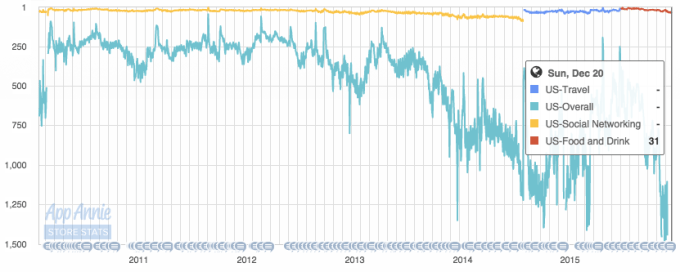We’re hearing a lot of chatter that Foursquare is in the process of raising a new fundraising round that will be a down round.
If the round gets completed at a lower valuation than the last one, that’s not too shocking. The current investment environment has led many startups to pack on the pounds to prepare for leaner days potentially ahead. At this juncture, the rewards of getting the money you need to grow outweigh the optics of a decrease in valuation.
The exact dollar value of what the company is raising couldn’t be learned, or the valuation, but it still represents a haircut for the company. One source tells us that Microsoft, which participated in a previous financing round, is also looking to participate in its current round.
Still, the fact that Foursquare — once one of New York’s hottest startups — is raising another financing round at a lower valuation than its previous one is significant. Down rounds tend to show both a more conservative interest in the company’s core business, and potentially slowing growth for the startup. Foursquare, essentially, has to find a new way to impress investors with strong growth — which requires some rejiggering.
As usual, the terms of the deal could be fluid, and any valuation could change over the course of the company’s negotiations for the terms of its financing round. This isn’t the first “down round” for Foursquare. The team raised capital at a reported $650 million valuation in 2013, beneath the $760 million price tag it had in 2012. In total, the company has raised $162 million in venture financing and debt.
A Microsoft spokesperson declined to comment. A representative from Foursquare declined to comment.
The company split off its check-in service, Swarm, from its primary venue and recommendation app in May last year. The split was an interesting move for Foursquare, but the app hasn’t really gained significant traction in the same way Foursquare become a momentary phenomenon after launching out of South by Southwest in 2009. For the most part, the split appears to have been unsuccessful. Here are the rankings on the App Store for Swarm over time from AppAnnie:

While Foursquare has shown to have significant more traction than Swarm, it too hasn’t captured the same momentum that the original New York-based startup garnered with its first application circa 2010. Still, the app continues to have a 4.5 star rating on the App Store. Here are the rankings for Foursquare on the App Store over time from AppAnnie:

Still, the company has a whole other side of its business, including its Pinpoint mobile advertising service and other business solutions. These aren’t reliant entirely on the success of the app, and leverage the company’s powerful data store — something which is still highly valuable for the company, but more on that later.
Foursquare’s website says it has more than 55 million people registered for its service, with more than 2 million businesses claiming locations. It has more than 170 employees based in New York, San Francisco and London, according to the site.
Leveraging Foursquare’s Data
Why does Foursquare believe it is important to raise a chunk of change now? The company isn’t saying, but for clues just look to the firms recent data ‘win’ when it came to predicting sales volume of Apple’s latest iPhone. By measuring foot traffic in the vicinity of Apple Stores over several years, Foursquare was able to pretty much nail those predictive numbers. It’s difficult to contextualize just how hard this kind of prediction is to apply at scale. There are dozens of vendors that do it in a localized fashion by deploying sensors, line counters, cameras and other systems. If Foursquare can scale its own methodology, though, it could become an essential arrow in the quiver of any business looking for accurate sales predictions.
Until now, this kind of data was provided as a sort of bonus to customers of Foursquare’s other products. If it wants to spin up the data side of its business into a full-fledged empire, it’s going to take cash to craft sales teams, build products and, yes, pave runway enough to get it flying.
This kind of weaponized location-based analysis goes far beyond the data deals Foursquare has offered previously. Some of those include commercial deals with customers like Apple to tap into their deeper data firehose for ground confidence in Maps searches and business listings. According to Foursquare’s Jeff Glueck in June, over 40% of its total revenue comes from powering other platforms’ location services. Seems like something to look into.
There’s a good reason why the Microsoft part of the story makes sense: It already has a relationship with Foursquare, for one, and as part of that deal it gained access to the company’s significant store of data.
While Foursquare’s check-in services may have seen a lot of criticism, it appears that the company is still able to attract new venture financing. That may be on the strength of the company’s data, which for example attracted Microsoft as a suitor for its last financing round. In its last financing round, the deal will had Foursquare’s data contributing to the Bing platform’s location and context layers on both Windows 8 and Windows Phone.
To be sure, however, Foursquare’s data has always been valuable given that it built up a significant store of information about venues — including more accurate fences around venues, ratings, and reviews for places like restaurants. For example, any company that wants to translate GPS coordinates into an actual venue could pay Foursquare for its data.
As the world goes mobile and more of computing is done outside the household, Foursquare’s data could power hyperlocal advertising or marketing pointing to businesses just a few feet away. Search results, news feeds, and more could be personalized through an understanding of location.
Missed Opportunities
As Foursquare spent its time splitting its app in two, other social networks replaced Foursquare, by making it easier to share what you’re doing in the moment. Foursquare originally powered Instagram’s location engine, but Facebook eventually made the shift to handling that itself, with locations essentially ending up a feature — not a separate application. It also removed its playful Mayor feature, and later had to re-add it to appease its user base in June this year.
All this distills down to a missed opportunity for Foursquare, which found itself experimenting with new kinds of social networking tools while new networks slowly chipped away at its user base. While the company was certainly experimenting, it apparently was not enough as the app slowly lost popularity. So, inevitably, Foursquare had to find a new way to show the company is valuable and get financing to grow — even if it has to shave off its valuation in the process.
Update: Story updated with additional information about how Foursquare could use this new funding.
Matthew Panzarino contributed reporting to this article.































Comment